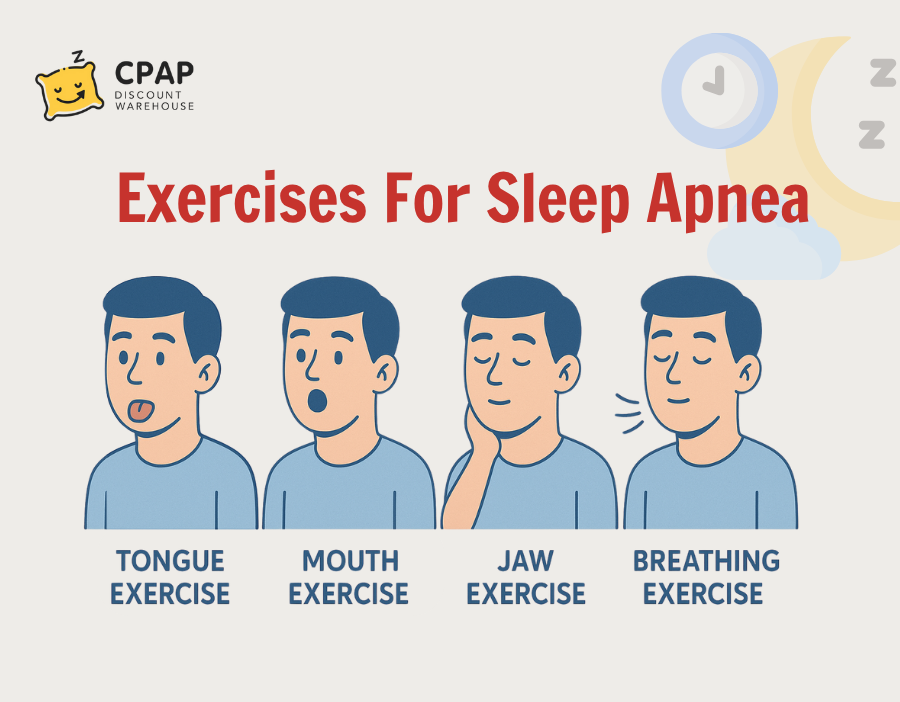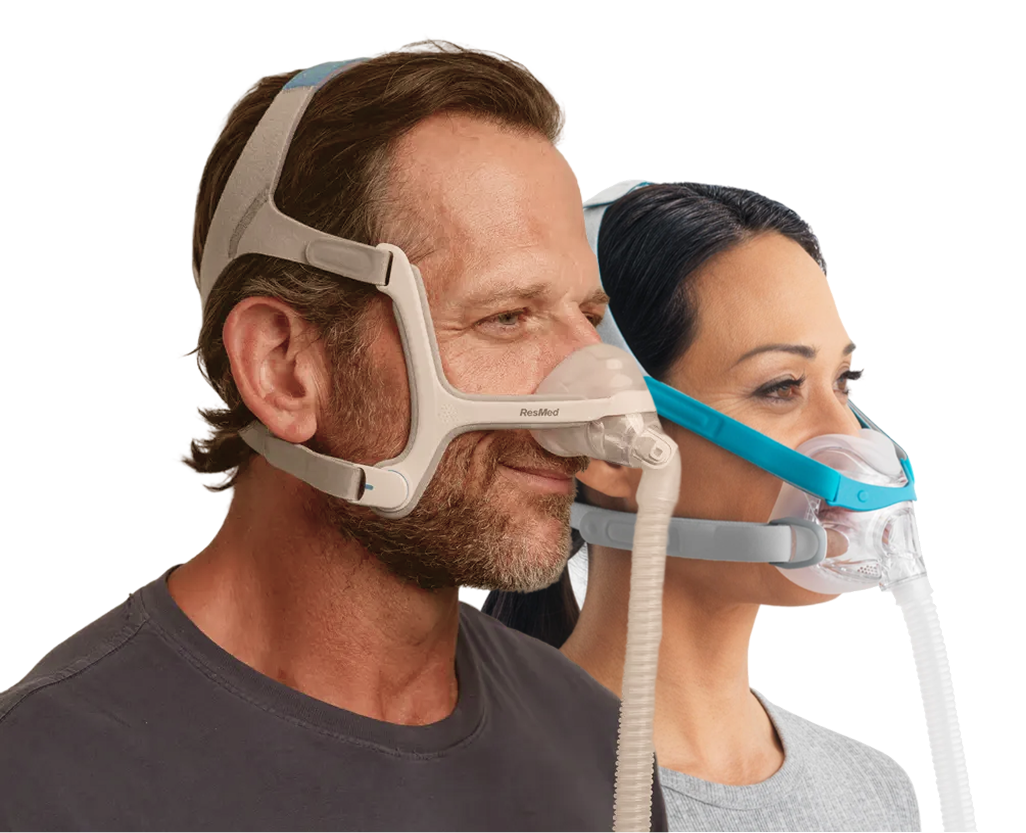Snoring may seem harmless, but it can be an early sign of obstructive sleep apnea, a condition where breathing repeatedly stops during sleep. As more people seek natural ways to improve their sleep health, sleep apnea exercises are gaining attention for their ability to strengthen airway muscles and reduce symptoms. At CPAP Discount Warehouse, we support safe, noninvasive solutions that help you breathe easier and sleep better.
How Do I Stop Snoring Naturally?
If you're looking for a natural way to reduce snoring, oropharyngeal exercises may be a simple and effective solution. These exercises are designed to strengthen the muscles of the mouth, tongue, and throat, which can help keep your airway open during sleep and reduce the vibrations that cause snoring.
In Australia, approximately 8 percent of adults are affected by obstructive sleep apnea, and many go undiagnosed. With growing awareness of sleep-related issues, more people are turning to non-invasive treatments that fit easily into daily life.
Key benefits of oropharyngeal exercises include:
-
No need for special equipment
-
Completely drug-free
-
Safe and suitable for mild to moderate cases

Understanding the Link Between Exercise and Sleep Apnea
Sleep apnea occurs when soft tissues in the upper airway collapse during sleep. Weakness in the muscles of the throat and tongue can make the problem worse. Strengthening these muscles can help prevent airway blockage.
Several studies support the use of exercise and sleep apnea as a treatment strategy. These exercises aim to improve muscle tone in the upper airway, making it easier to breathe during sleep. While general exercise is good for overall health, targeted sleep apnea physical exercise can be more effective for this specific issue.
Some people with sleep apnea also experience exercise intolerance, meaning they tire easily or feel breathless during physical activity. In these cases, gentle and focused movements like breathing exercises or myofunctional exercises offer a practical alternative.
Five Anti-Snoring Exercises That Really Work
Tongue Exercises for Sleep Apnea
The tongue can fall back during sleep and block the airway. Strengthening the tongue reduces this risk. Try these:
-
Tongue press: Press the tongue flat against the roof of the mouth and hold for five seconds. Repeat ten times.
-
Tongue slide: Touch the back of your top front teeth with the tongue tip, then slide it back along the roof of your mouth. Do this ten times.
-
Tongue resistance: Push your tongue against a spoon or finger for five seconds and release. Repeat ten times.
Throat Exercises for Sleep Apnea
Strong throat muscles help keep the airway open. These exercises can help:
-
Gargling: Gargle with water for thirty seconds twice a day.
-
Vowel repetition: Repeat vowels like A E I O U clearly and slowly for three minutes.
-
Uvula lifts: Say "ah" while looking in the mirror and try to lift the uvula repeatedly.
Singing Exercises for Sleep Apnea
Singing works several upper airway muscles. You do not need to be a professional singer to benefit from this.
-
Sing simple sounds such as "la la la" or "mah mah mah" in a controlled way.
-
Practice ten minutes daily focusing on breath control and clarity.
-
Use different tones and pitches to engage multiple muscles.
Breathing Exercises for Sleep Apnea
Breathing patterns can affect the severity of sleep apnea. Two techniques are particularly helpful:
-
Diaphragmatic breathing: Lie on your back with one hand on your belly. Inhale slowly through your nose, letting your stomach rise. Exhale through your mouth. Practice for five minutes daily.
-
Buteyko method: Focus on slow nasal breathing and short breath holds to improve carbon dioxide tolerance and reduce overbreathing.
Neck and Soft Palate Exercises
The neck and soft palate play an important role in keeping the airway open. Try these exercises:
-
Head tilts: Gently tilt your head forward, backward, and side to side. Hold each position for five seconds. Repeat five times.
-
Swallow resistance: Place a finger under your chin and swallow while pressing gently. This strengthens throat muscles.
-
Soft palate stretch: Yawn intentionally while saying "ah" to stretch the soft palate. Repeat several times a day.

>>>> The Link Between Obesity and Sleep Apnea: Causes & Treatments
The Most Effective Exercises for Sleep Apnea
Looking for the best exercise for sleep apnea? Research supports targeted muscle training as an effective, natural solution. A 2015 study in the International Archives of Otorhinolaryngology showed that people with mild to moderate sleep apnea who practiced oropharyngeal exercises reduced their apnea hypopnea index by up to 39 percent.
These exercises to improve sleep apnea strengthen airway muscles, addressing the root cause of obstruction. Unlike CPAP, which offers immediate pressure-based relief, myofunctional exercises help maintain long-term muscle tone.
You can easily add these exercises to your daily routine while brushing your teeth, during yoga, or before bed. When done consistently, they are a powerful way to reduce symptoms and improve sleep quality.
Are There Exercises for Sleep Apnea That Replace CPAP?
It’s important to be realistic: exercises for sleep apnea are most effective for mild to moderate cases. For severe OSA, CPAP therapy remains necessary.
However, these exercises can:
-
Serve as a complementary therapy to CPAP
-
Improve muscle tone and potentially reduce pressure settings
-
Provide an alternative option when traveling or during CPAP breaks
-
Be an empowering part of a long-term lifestyle approach to sleep apnea management
The key is consistency. Most studies suggest that visible improvements occur after 8–12 weeks of daily practice.

FAQs
Do tongue exercises help sleep apnea
Yes. Tongue exercises help prevent the tongue from blocking the airway during sleep. Studies show they can reduce snoring and lower the severity of apnea events.
Can breathing exercises help with sleep apnea
Yes. Breathing exercises like the Buteyko method and diaphragmatic breathing promote better oxygen control, which may ease symptoms of mild sleep apnea and reduce snoring.
Does exercise improve sleep apnea
Definitely. Both general physical activity and targeted muscle exercises reduce fat and strengthen key muscles that support the airway, leading to better sleep and fewer apnea episodes.
>>>> Life Expectancy of Sleep Apnea: What You Need to Know
Conclusion
While CPAP remains the most effective treatment for severe sleep apnea, incorporating sleep apnea physical exercises can significantly improve symptoms in mild and moderate cases. From tongue and throat workouts to breathing drills and soft palate exercises for sleep apnea, these movements are accessible, safe, and drug-free.
At CPAP Discount, we support holistic approaches to better sleep. Whether you are using a CPAP machine or exploring alternative methods, incorporating sleep apnea exercises into your routine is a smart and natural step toward restful nights. Strengthening your airway muscles can significantly reduce symptoms and improve your overall sleep quality.
References
-
Mouth Exercises to Stop Snoring – https://www.sleepfoundation.org/snoring/mouth-exercises-to-stop-snoring – Published on May 24, 2023
-
Exercises to Reduce Sleep Apnea – https://www.sleepcareonline.com/articles/exercises-to-reduce-sleep-apnea/ – Published on March 17, 2022
-
Effective Exercises for Sleep Apnea: A Pulmonologist’s Guide – https://www.pulmoconsult.com/effective-exercises-for-sleep-apnea-a-pulmonologists-guide/ – Published on January 12, 2024






